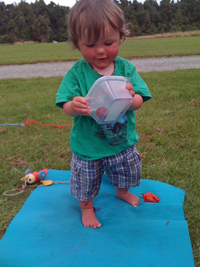by columnist Gabrielle Harris, The Suburban Yogini
When I was thirty I literally FELL pregnant.
I was living in a small town in Greece teaching English and my partner was living in NZ. I liked to think of it as an immaculate conception but the Greek mamas liked to think of it differently, I was the spawn of the devil, unmarried and pregnant.
My daughter was a gift, a message in a bottle, learning and a teaching all rolled into one big fat ball. Not that I knew any of that.
Roll forward in time 15 years and I’m in the middle of a rather dark teacher training course. As I’m sitting there people are getting up one after the other to report things that had become apparent to them after too much yoga, not enough sleep and plenty of prodding to reveal their core negative beliefs.
My first thought was ‘Holy shit I have to get out of here’ and my second thought was ‘ How can these people be so messed up about their parents?’.
One after one they stood and revealed how their parents didn’t love them in so many ways. It was horrifying for me. I had to get out and go and see my children and apologise for all the ways I had messed them up. I was guilty of the lot. I was a terrible parent, systematically screwing up my children until one day they would stand up in front of 40 people and tell them what I had done wrong. I had to stop it, I had to find a way to ban yoga teacher training courses, landmark courses or any other forum for these revelations.
So how to stop screwing up our children right here right now?
And how does it even happen that some of us carry this suffering with us and some of us just get on with things? By all accounts I should have been the key note speaker at that training with my own podium revealing to all who would listen about my childhood. But something was missing, I didn’t feel that way, I didn’t feel messed up even though I had a pretty dramatic childhood.
Here are my new golden rules about raising children.
Part 1 How to screw up your children:
1. Expect something of them that you never achieved.
So you didn’t go to university but you are damm sure your child is going to go. Keep pressuring them and telling them that they are going to university, don’t worry about what they want to do, it’s vital that you make them understand the mistakes you made and the ones you don’t want them to repeat. After all you know best right? Studies have revealed that when your child is younger they believe everything you say is correct, if you keep going like this, studies will reveal that they think nothing you say is correct.
2. Pass your fears onto them any way you can.
Let me give you a simple example. Our neighbour hates animals. We have a dog that looks and acts like a slipper. When said neighbour comes down with her small relatives she yells out restrain your dog and shouts and tells the now quivering child that it is ok you are now safe from the dog ( killer slipper).
The child now has a fear of animals. The child will have that for a long time now and probably pass that one on down the family tree.
I now watch as my daughter squeezes my son’s hand to the point it goes blue when they cross the road. Hang on didn’t I do that to her from fear of her running on the road?
These are just wee fears. Here are some big ones – body image, fear of people, limiting beliefs about your intelligence, selfishness or hoarding due to fear of not having enough, jealousy for fear of not having enough, thinking people don’t like you.
3. Get peed off with them because you are having a bad day.
Oh so easy to do so hard to stop. You are tired, hungry, stressed and little person is happy, loud, painting on walls, crying as well. Shout at them, throw your own toys, act like a baby.
4. Don’t listen to them, just give them advice.
My own research shows that I am pretty much off the mark with communication with my children. Instead of trying to work out what it is they are trying to tell me I prefer to get through my own agenda of advice and helpful comments when most of the time they just want to talk and be heard. What are they asking you for?
Part 2 How not to screw up your children:
- Love them as much as you can.
- When you do screw up yourself, say sorry. Children are very forgiving. Try again.
- Understand what your own issues, fears, dramas are and catch yourself as you repeat the pattern to your children. Work on the dilution principle, pass sown a drop of your fears but not the whole glass.
- Take time with them, listen to what they are saying.
- Give them lots of hugs.
I really like this explanation of love from Judith Hansen Lasater’s book ‘Living Your Yoga.’
When you react you are not in a state of love. When you can love without expectation, you are in a state of pure love. Love in its purest sense is not what you get from the relationship but on what the relationship allows you to give. The depth of your love is not reflected in what the other makes you feel, but in your willingness to give of yourself.
Message in a bottle.
Maybe this is the reason I wasn’t the key note speaker at the teacher training. I was raised on love without expectation in all its forms. Even though my parents messed up I had a deep underlying sense that under everything was this constant smile of love.
I read somewhere that all a child ever wants is for your face to light up when they walk in the room.
This is one thing we can do every day.
This is our practice.


i love this Gabrielle, thank you x
Great article Gabrielle… love how you start with such clear instructions on HOW to screw up your children… Yoga certainly helps me parent a helluva lot better than I would without it….
This is a really nice article.
For me, one of the most amazing and life changing aspects of my parenting was the first time my son held me accountable for my actions.
I’d ended our nursing relationship poorly. I was simply under too much strain, and something had to give. But I didn’t do it well.
About a month later, DS comes and asks me about it. I can see his trepidation in broaching the subject, so we snuggle up and I ask him what he is thinking. He asks me about the nursing relationship, about what happened during that month. I ask him how it made him feel, and he is open and honest and tells me how painful it was. He poured out his little heart — he had internalized so much. . . fear that I no longer loved him, that he wasn’t good enough or somehow “right” or deserving. It was very painful for me to hear.
And after hearing it all, I said to him that I was very sorry. I told him that I had been struggling, and that, sadly, that I acted out inappropriately in our relationship due to that stress, and he was the one who got hurt. I apologized sincerely to him for it, and he wept.
Holding him while he wept, I began to feel us knit back together. I started to see how he was knitting himself back. His fears of not being good enough, right, deserving or loved had dissipated. He knew that he was all of these things in my eyes, but in himself too. By bringing voice, by hearing me take full responsibility for what occurred and apologizing to him for having done it, he was able to reconcile himself within.
Likewise, we were able to repair and reconcile that part of our relationship. I knew that it was amiss — on my end in particular, and I was feeling some hesitation from him as well. But holding him while he grieved this monumental thing in his life put us back together again, too.
I want this to become a recurring pattern in our lives. Instead of a teacher training, I’d rather he come to me and say “this is how I feel about what happened. This is the outcome.” And I can own my part.
I think that for many of us, many people in our lives do not own their part. There are many areas where I have spoken my piece (usually how I felt about a situation) to my parents, but they refuse to hear it. Or, they excuse it “I did the best I could.” Yes, I know that you did the best you could; and I know that I’m doing the best that I can; but we still need to take responsibility that sometimes, even our best is hurtful or less than what was needed at the time.
And maybe we’ll come to understanding. Maybe we’ll be able to better repair ourselves within as well as repair our relationship between.
I want to do that with my son. I want him to know that I know that my best isn’t always THE best.